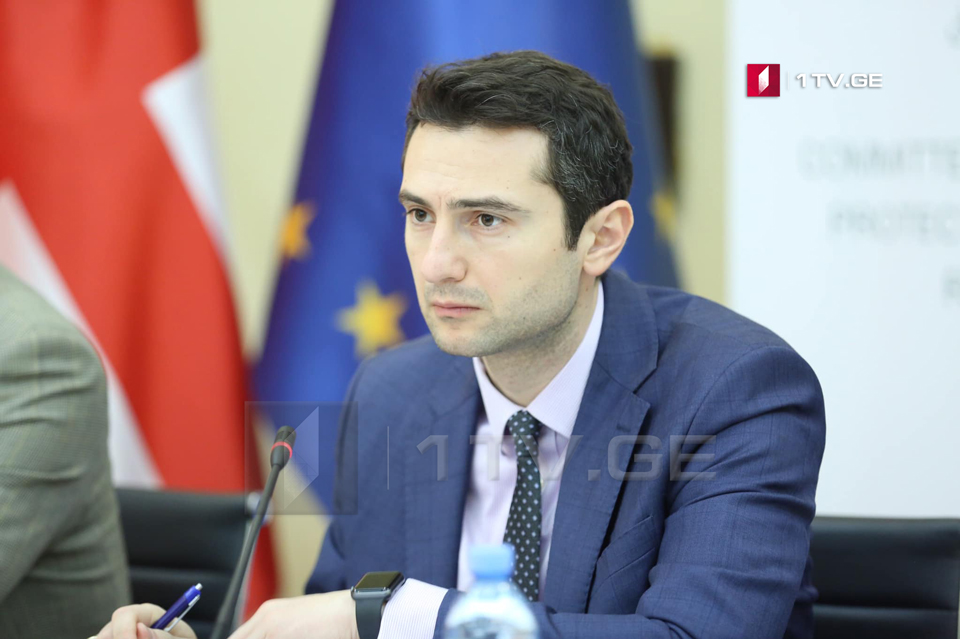
Georgian Parliament Speaker Kakha Kuchava has responded to a joint letter published on May 22 by European Union Ambassador Carl Hartzell, US Ambassador Kelly Degnan, and Head of the European Council Office Natalia Vutova regarding the judicial reform.
Kakha Kuchava pledges that when making the judiciary-related decisions, the Georgian parliament would act based on the Constitution, the legislation, the principle of independence of the judiciary, and the 19 April Mediation Agreement.
“Dear Ambassadors, Mrs Vutova, first of all, thank you for your letter. On April 19, the political parties signed an agreement that, among other things, contains judiciary-related issues. Namely, by the end of the 2022 spring session, the practice of implementing the third and fourth waves of judicial reform should be studied, and, based on the findings, a new judicial reform package should be developed with the involvement of international experts. This package should also include issues of the High Council of Justice. The Parliament of Georgia should faithfully fulfill the mentioned condition of the political agreement and, in line with the terms stipulated in the paper, and based on a transparent and inclusive process, adopt the relevant legislative package by the end of next spring session.
As we all know, the Parliament of Georgia hastily reviewed and endorsed the amendments to the law on the election of the Supreme Court judges. In particular, following the political agreement, legislative changes were adopted, which fully reflected all three key recommendations of the Venice Commission regarding the election of the Supreme Court judges: a) an open ballot system was introduced; b) the High Council of Justice has been obliged to decide on the nomination of candidates according to the points assigned to the candidates; c) the rule of the double appeal of the High Council of Justice decisions has been introduced. Following these changes, vacancies were re-announced, and only then the procedure for selecting Supreme Court judges has been resumed. This very condition was reflected in the political agreement. Given that the decision of the High Council of Justice to nominate candidates for the Supreme Court will be in full compliance with the key recommendations of the Venice Commission, which is part of a political agreement, the Parliament of Georgia is obliged to act by the Constitution of Georgia and approve the candidates aligned with the rules established by the Georgian legislation.
A working group meeting is scheduled for the next week to make a work plan on judicial reform, all the political parties will be presented during the process. As stated in the Constitution of Georgia and relevant legislation, the Parliament of Georgia is responsible for approving non-judicial members of the High Council of Justice in June this year.
Therefore, the Parliament of Georgia is not allowed to wait for legislative changes to be made at the 2022 Spring Session and leave five vacancies at the Council unfilled within the next year. Hence, the Parliament of Georgia is required to announce a competition for the selection of candidates shortly. At the same time, the Parliament of Georgia realizes the obligation to elect the members of the Council with the proper involvement of political parties. As the Speaker of the Parliament of Georgia, I am responsible for ensuring this process.
As the Speaker of the Parliament, whose primary duty is to comply with the Constitution of Georgia and the procedures provided by law, also act per the terms of the political agreement, I underscore once again that, when making decisions related to the judiciary, the Parliament of Georgia will as act based on the Constitution of Georgia, the legislation of Georgia, the principle of independence of the judiciary and the agreement signed by political parties,” Kakha Kuchava stressed.
The EU and the US Ambassadors called on the parliament on Saturday “to start inclusive discussions on the institutional reform of the High Council of Justice and, accordingly, to revise the rules for judicial appointments to courts, for handling disciplinary measures against judges, and to introduce transparent and comprehensive systems of appraisals, promotions, and transfers of judges and judicial staff in line with international standards and best practices. These discussions should include civil society, the Georgian Bar Association, the Public Defender, and the opposition.”
The joint letter came after the civil activists addressed EU and US Ambassadors earlier in May requesting to “defuse political crises in Georgia.”





